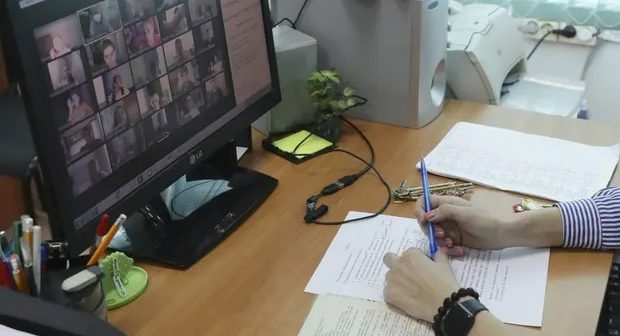Education Desk: Universities have been urged to safeguard students and staff who are using video conferencing. Photograph: Kirill Kukhmar/TASS
Students are posting extreme pornography in online lectures, prompting academics to warn that the switch to digital learning in the coronavirus pandemic will increase harassment at UK universities.
Several universities have taken disciplinary action against students for posting abusive images in lectures hosted on the Zoom video app in the past week, according to Aisha Gill, professor of criminology at Roehampton University.
The cases come after the University of Derby suspended six students over “degrading and offensive” comments allegedly made about their female peers in an online group chat, and a leaked report found Warwick University lacked internet filter software to block students and staff from accessing inappropriate or illegal material.
Gill, who is also co-chair of End Violence Against Women, said she knew of three to four incidents at different universities in the past week where students had posted abusive sexual images in live Zoom lectures. “We’re talking really disturbing, violent, pornographic images,” she said. “Action is being taken.”
Gill said universities urgently needed to improve their online security, such as stronger internet firewalls.
“The lockdown has really brought cyber-bullying into sharp focus, particularly online harassment,” she said. “I feel it’s spiralling out of control. Universities are not prepared because they’re firefighting with emergency responses to Covid-19.”
Since the lockdown began, several black academics and educators have posted accounts on Twitter of racist “zoombombings”, where uninvited guests abuse the popular video service to broadcast offensive content. These incidents, which occurred in non-university lectures and seminars, have included being targeted with racial slurs, such as the N-word, by people wearing Ku Klux Klan-style robes.
Experts on online harassment said universities’ own computer networks were also vulnerable to abuse. They pointed to a recently leaked report on data security at Warwick University, which found it lacked internet filter software to block students and staff from accessing inappropriate or illegal material.
The internal audit of cyber security, seen by the Guardian, also found that IT monitoring at the university, which has been criticised for its handling of a “rape chat” scandal, was “not sufficiently robust to be useful to investigate and treat a cyber security issue”.
Advertisement
Andy Phippen, professor of digital rights at Bournemouth University, said the failings identified by the report were unlikely to be limited to Warwick. A freedom of information investigation he undertook last year revealed that most universities lacked adequate policies or procedures to address online harassment.
“I’ve seen no evidence of improvement since then,” Phippen said. “There’s a significant risk of more incidents as universities switch to online education.”
Worried about Zoom’s privacy problems? A guide to your video-conferencing options
Rachel Watters, NUS women’s officer, said: “The sudden shift to mass online learning on new platforms has revealed weaknesses in policy and practice in relation to online misconduct and harassment. NUS urges institutions to safeguard students and staff using video conferencing, and to hold perpetrators accountable through disciplinary procedures.”
A spokeswoman for Universities UK, which represents 137 higher education institutions, said online safeguarding has been a key consideration in the shift to delivering more education online.
A Warwick University spokesman said it had invested significant time, effort and resources in the past two years – and recruited 19 new staff – to systematically tackling the complex and urgent challenges that information security and data protection posed.
He added: “On online teaching we continue to refine and enhance the security around each initiative that has been developed to introduce more online teaching in these challenging new times.”
A Zoom spokesman said it was deeply upset to hear about abuse on the app. “Zoom strongly condemns such behaviour and is committed to providing educators with the tools and resources they need on a safe and secure platform,” he said.




